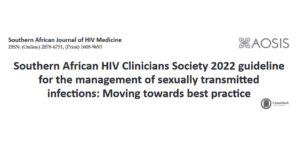World Obesity Day is on 4 March 2024, and our nation needs to pay attention. As with the HIV epidemic in the 1990s, we are facing a calamitous threat to the health of the population that has been ignored for too long. Weight-related diseases have eclipsed tuberculosis (TB) and HIV as leading causes of morbidity and mortality. Over two-thirds of South African (SA) women are overweight or are living with obesity.[1] For example, type 2 diabetes, stroke and heart disease, conditions all directly linked to the disease of obesity, account for three of the top four causes of death nationally and incur massive health system costs.[2,3] Moreover, excess weight gain has deleterious effects far beyond cardiovascular disease risk, with evidence strongly linking it to poor pregnancy outcomes, cancer, liver and kidney disease, mental illness, and sleep disorders.[4,5]
As with HIV in the early 2000s, tools to prevent and treat obesity are available, but too often are being ignored or obfuscated through government inaction, industry interests, and societal inertia. Also, as with HIV, SA has waited too long to convert effective interventions into effective public health strategy. Instead, we remain trapped in a cycle of apathy while blaming and stigmatising those affected.
The medical establishment has not always been an ally in combating the obesity health emergency.[6] A poor understanding of the physiology of the disease, the endocrinological complexity of fat tissue, and the contribution of diet and exercise to weight gain has led healthcare providers to preach the common refrain of ‘eat less and move more’. This serves to further perpetuate shame and stigma for those with the disease, even as it is now well understood to be ineffective alone for most of those affected.[7] Unsuitable weight loss advice contributes to confusion and anxiety for individuals with obesity, and in turn allows a diet, exercise and supplement industrial complex to thrive with minimal regulation.[8]
But it is not too late for SA to implement an effective response to this established disease crisis. There are two important next steps. First, to apply the lessons from the HIV epidemic to reduce obesity-related stigma and facilitate widespread access to novel anti-obesity therapies using a public health approach; and second, to establish robust advocacy efforts that ensure that structural determinants of the disease, including food supply and the built environment, promote, rather than undermine, health.



